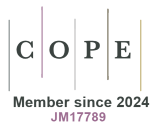Most read articles by the same author(s)
- Eugenio Di Brino, Claudio Jommi, Price and reimbursement of medicines when new indications are approved: the results of a survey on ISPOR Italy Rome Chapter members , Global and Regional Health Technology Assessment: Vol. 10 No. 1 (2023): January-December 2023
- Patrizia Popoli, Giovanni Giuliani, Arturo Cavaliere, Claudio Jommi, Early access programs for medicines: a reform proposal for the Italian National Health Service , Global and Regional Health Technology Assessment: Vol. 11 No. 1: January-December 2024
- Claudio Jommi, Francesca Patarnello, Cosetta Bianchi, Giuliano Buzzetti, Assessment of innovativeness, and price and reimbursement negotiation of medicines: recommendations of an expert panel , Global and Regional Health Technology Assessment: Vol. 11 No. 1: January-December 2024
- Carla Rognoni, Arianna Bertolani, Claudio Jommi, Budget impact analysis of rituximab biosimilar in Italy from the hospital and payer perspectives , Global and Regional Health Technology Assessment: Vol. 5 No. 1 (2018): January-December 2018
- Dario Lidonnici, Virginia Ronco, Martina Isernia, Elena Lanati, Claudio Jommi, Pier Luigi Canonico, Armando A. Genazzani, Access times to medicines in Italy in the period 2015-2017: Analysis of the evaluation times of the Italian Medicines Agency , Global and Regional Health Technology Assessment: Vol. 5 No. 1 (2018): January-December 2018
- Carlo Lucioni, Claudio Jommi, Value of health technologies, HTA and decisions , Global and Regional Health Technology Assessment: Vol. 4 No. 1 (2017): January-December 2017
- Hans Severens, Andrew Dillon, Francois Meyer, Claudio Jommi, Iga Lipska, Pier-Luigi Canonico, Oriol Solà-Morales, Herbert Altmann, Paving the road for a successful EU HTA Reform implementation , Global and Regional Health Technology Assessment: Vol. 12 No. 1 (2025): January-December 2025
- Claudio Jommi, Innovation and Drugs Price and Reimbursement: A Comparison between Italy and the other Major EU Countries , Global and Regional Health Technology Assessment: Vol. 2 No. 3 (2015): September-December 2015
- Claudio Jommi, Francesco S. Mennini, Pier L. Canonico, Paolo Bruzzi, Immuno-Therapy in the Treatment of Cancer: Implications for Efficacy and Economic Evaluations , Global and Regional Health Technology Assessment: Vol. 3 No. 1 (2016): January-April 2016
- Claudio Jommi, Spending caps for pharmaceuticals within the pharmaceutical policies framework: critical issues and reform options , Global and Regional Health Technology Assessment: Vol. 12 No. 1 (2025): January-December 2025









